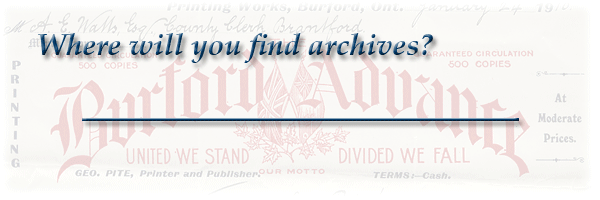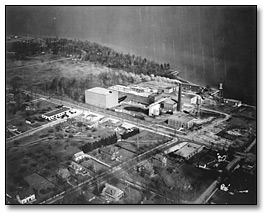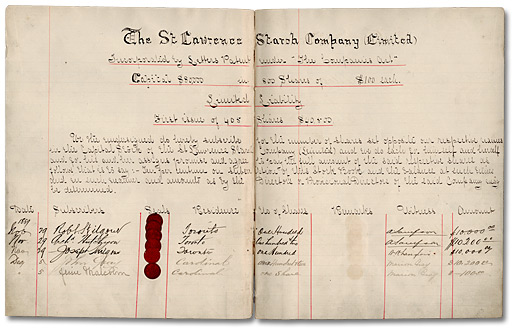
Canada has over 800 archives that can be used by researchers.
- Archives Canada has links to all the provincial and territorial networks.
- ARCHEION is Ontario’s Archival Information Network and gateway to archival records located in archives across Ontario.
These are both excellent starting points for becoming acquainted with the many different types of archives, the groups they serve, and their specialties. Knowing these differences makes it easier to determine where to begin researching a topic.
Most governments have departments or agencies responsible for preserving records of enduring value. Library and Archives Canada manages the federal government archives and documentary heritage for Canada. In Ontario, the Archives of Ontario is the premier source for documentary heritage for the provincial government and private sector. Other provinces and territories maintain their own archives as do municipalities.
![Canada White Laundry Starch label, [190- - 1905]](pics/f4392_starch_label_270.jpg)
Click to see a larger image (175K)
Canada White Laundry Starch label, [190- - 1905]
St. Lawrence Starch product labels :
functional labels and reproductions
Reference Code: F 4392-3-3-2, D 294
Archives of Ontario
Historical societies, libraries and museums also maintain archives. Public libraries and local museums often have strong local history collections with maps, memorabilia, photographs, and genealogical records.
Corporations, hospitals, universities, churches and many other types of organizations keep records to document their activities. The parish records kept by churches about people have been a resource for genealogists for centuries. These organizations might also receive materials from its members or the community it serves. A university, as an example, might receive donations from alumni, faculty, authors, or local citizens.
A recent generous donation to the Archives of Ontario by the St. Lawrence Starch Company included a tremendous variety of material, from the company archives, relating to the day-to-day operation of the corporation.
![Photo: Bee Hive Corn Syrup delivery truck, [ca. 1940]](pics/26309_truck_270.jpg)
Click to see a larger image (84K)
Bee Hive Corn Syrup delivery truck, [ca. 1940]
St. Lawrence Starch Vehicles
Reference Code: F 4392-2-0-18, D 293
Archives of Ontario, I0026309

Click to see a larger image (84K)
View of Port Credit and area surrounding
the plant, 1933 St. Lawrence Starch
property images: exterior
Reference Code: F 4392-1-1-6
Archives of Ontario, I0026308

Click to see a larger image (234K)
First share subscription/issuance document or share subscriptions and
transactions ledger excerpt, 1889, St. Lawrence Starch Company and
subsidiaries official corporate records
Reference Code: F 4392-20, box 60
Archives of Ontario